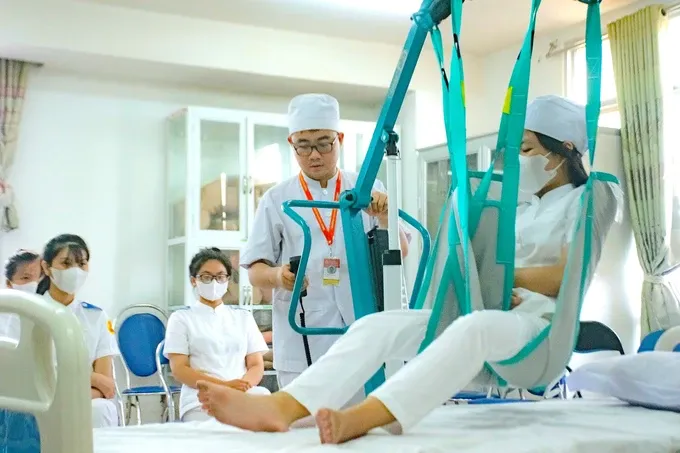
The proposed level of tuition assistance would correspond to the amount charged by training institutions.
While students express optimism regarding the potential implementation of these proposals, certain higher medical training institutions have underscored the importance of a comprehensive and judicious assessment by the Government to ensure the financial viability and sustainability of these initiatives.
22-year-old Nguyen Tan Quang hailing from Ba Ria - Vung Tau Province is currently in his fourth year of medical studies at Ho Chi Minh City University of Medicine and Pharmacy. Coming from a financially challenged background, he was fully aware of the challenges that lay ahead when he decided to pursue a medical degree in 2021 as Quang's mother is disabled, and his father works at Long Son Industrial Park. He shared a rented room with two friends, and despite their efforts to keep costs low, their monthly expenses for travel and accommodation amount to VND4 million (US$157.6).
To alleviate the financial burden on his family, Quang takes on tutoring jobs outside of school.
Quang said that starting from the 2023-2024 academic year, universities will implement tuition fees in accordance with the Government’s Decree 81 and Decree 97 resulting in an increase compared to prior time. Recently, his father had to secure a loan exceeding VND82 million to cover the tuition expenses. If the Government were to provide full support for tuition fees, it would bring great joy to him and other students from families with financial difficulties. This policy would greatly assist many talented students from families that lack the financial means to confidently pursue their medical studies, Quang expressed.
Vice President Tran Anh Tuan of the Ho Chi Minh City Vocational Education Association noted that tuition fees for medical and pharmaceutical programs are presently the highest among all university disciplines. For the 2024-2025 academic year, institutions that have not yet met their regular operational costs will charge VND27.6 million for medicine and pharmacy courses, while other health-related fields will have a tuition fee of VND20.9 million.
In self-financed public schools, tuition costs are significantly elevated. For instance, Ho Chi Minh City University of Medicine and Pharmacy charges between VND41.7 million and VND84.7 million annually, depending on their chosen majors.
Meanwhile, Ho Chi Minh City University of Health Sciences has tuition fees set at VND60 million per year for medical programs and VND55.2 million per year for other health-related disciplines. In contrast, private universities and colleges have tuition fees that vary from VND30 million to VND250 million per year.
Vice President Tran Anh Tuan revealed that when his staff gave consultation on admissions in provinces and cities, parents and students are most concerned about medical school tuition fees. Therefore, the Ministry’s proposal of tuition exemption for students of medical training facilities is logical.
A university representative involved in health sector training stated that state support for tuition fees for students in medical and pharmaceutical disciplines would be highly beneficial. However, they emphasized that, for the time being, this initiative should be limited to students pursuing studies in areas experiencing a shortage of personnel within the health sector.
After graduation, students must be obligated to fulfill their duties as assigned by the State. This approach would ensure an efficient alignment between medical education and workforce needs. This can be considered a form of the State commissioning the training of human resources for the healthcare sector.
Professor Tran Diep Tuan, Chairman of the Council of the University of Medicine and Pharmacy in Ho Chi Minh City, noted that the qualifying scores of medical students are almost the highest among all majors. The extended duration of training and the high tuition fees pose significant challenges, particularly for outstanding students from disadvantaged backgrounds who aspire to become doctors.
Consequently, to encourage talented individuals to pursue studies in healthcare disciplines, implementing a tuition-free policy for medical and pharmaceutical students, similar to that of pedagogical programs, represents a highly compassionate and equitable approach that warrants prompt action.
Meanwhile, Vice Principal Phan Thi Le Thu of Vien Dong College in Ho Chi Minh City said that the policy needs to be implemented synchronously for both public and private schools, but an assessment of the training quality of the schools is needed.
In addition, she suggested that the Ministry not equate any school training in health majors to benefit from this policy if the schools do not meet the training criteria.
Next, according to her, the Ministry of Health and provinces and cities need to allocate transparent quotas, regardless of whether they study at public or private schools, so that through the vocational skills test, recruiting units can select the human resources they need. This not only helps students feel secure in their studies, but also ensures their long-term development in the health sector.
In expressing his support for this policy, Principal Nguyen Dang Ly of Ho Chi Minh City International College recognized its potential to significantly address the critical shortage of healthcare professionals, particularly in underserved regions. He emphasized the importance of Government support mechanisms, including tuition subsidies or financial incentives for private educational institutions, to ensure the preservation of student rights and the continued provision of high-quality medical education.
























